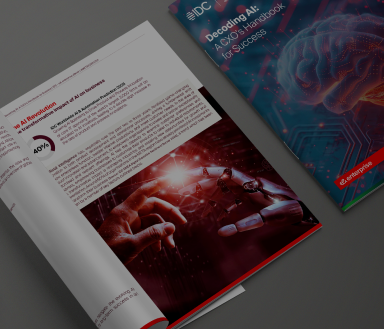Agentic AI Solutions
25 August, 2025
Did you know Agentic-AI would automate routine banking processes over the next few years?
What is Agentic-AI solutions and how does it work?
Agentic-AI marks a significant advancement in artificial intelligence. Much like human experts take on defined roles and responsibilities, Agentic-AI creates groups of independent intelligent agents that collaborate to solve complex, multi-step problems. These agents use sophisticated reasoning, iterative planning, and decision-making, with large language models functioning as their “brains.”
At its core, Agentic-AI refers to the development of AI agents capable of making autonomous decisions to perform tasks. This approach enables organisations to fully automate traditionally difficult, time-consuming, and labour-intensive processes — transforming how businesses operate through intelligent, self-directed systems.
Agentic AI uses a 4-step process for problem-solving:
Step 1: Perceive:
Agentic AI agents begin by gathering and processing data from a range of sources - including sensors, databases, and digital interfaces. This step involves extracting meaningful features, recognising objects, and identifying relevant entities within the environment to form an accurate understanding of the context.
Step 2: Reason:
A large language model serves as the central orchestrator or reasoning engine. It interprets tasks, generates appropriate solutions, and coordinates with specialised models for functions such as content generation, visual analysis, or personalised recommendations. This phase also employs advanced techniques like retrieval-augmented generation (RAG) to tap into proprietary data sources, ensuring that outputs are both accurate and relevant.
Step 3: Act:
Once a plan is formulated, Agentic-AI integrates with external tools and systems through application programming interfaces (APIs) to carry out tasks autonomously. Guardrails are implemented to ensure appropriate execution — for instance, an AI customer service agent might automatically process claims up to a predefined limit, while escalated claims requiring higher approval would be routed to a human supervisor.
Step 4: Learn:
Agentic-AI continuously evolves by feeding data from its interactions back into the system to improve underlying models. This feedback loop enhances its ability to adapt and increases overall effectiveness over time — enabling smarter decision-making and greater operational efficiency for businesses.
Agentic-AI Solutions Use Cases for BFSI companies:
Below are few BFSI use-cases but not limited to:
● New Employee Onboarding : Agentic AI can streamline the onboarding journey by learning role-specific requirements and automating access provisioning in line with each employee’s joining date.
● Identity Verification and KYC: It can accelerate and simplify the KYC and customer onboarding processes by integrating verification tools, automating data validation steps, and streamlining identity checks — significantly boosting operational efficiency for banks.
● Automated Loan Processing: Agentic AI offers tailored, real-time micro-insurance products and refines the loan approval process. It also analyses customer spending patterns and repayment history to recommend customised financial investment portfolios. Furthermore, it provides credit health insights based on individual financial behaviours.
● Automated Document Processing and Renewals: It simplifies document-intensive processes — including contract renewals and mortgage paperwork — by reducing error rates and accelerating turnaround times through automation.
● Debt and Portfolio Management: Agentic AI supports the planning of effective debt management strategies and simplifies related processes for consumers. It can also deliver personalised investment portfolios by analysing expenditure habits and loan repayment capabilities. Moreover, it adjusts strategies autonomously in response to real-time economic, social, and political developments.
● Financial risk management: By analysing market trends and financial data, Agentic AI helps assess risks and align decisions with customer objectives. It optimises outcomes in real time by making autonomous decisions related to credit exposure and investment strategies.
● Automated Credit Checks: It supports accurate credit assessments by analysing diverse data points such as transaction behaviours, utility payments, and financial resource allocation histories. Its advanced algorithms also help predict default risks. By offering personalised credit recommendations, Agentic AI enhances the overall customer experience for financial institutions.
● Customer Segmentation and Analysis: Agentic AI segments customers based on demographic and behavioural insights, enabling banks to tailor their offerings more effectively. It can detect evolving customer preferences, allowing institutions to refine services and stay ahead of market trends.
● Regulatory Compliance: It helps financial organisations stay compliant with evolving legal and regulatory requirements, ensuring service continuity. Additionally, it monitors regulation updates and streamlines reporting processes, thereby reducing the risk of non-compliance.
● Fraud and Deepfake Prevention: Agentic AI mitigates fraud risks by automating key investigative functions such as identifying suspicious activity, blocking compromised accounts, and tracking high-risk transactions. It can also detect inconsistencies in AI-generated content — including videos, images, and other media — to flag deepfake impersonation attempts. With its integration of big data analytics, machine learning, and self-learning capabilities, Agentic AI is well-equipped to detect even the most sophisticated fraud schemes.
Conclusion: Reshaping BFSI with Agentic AI Solutions
The integration of Agentic-AI is reshaping how banks engage with technology and execute everyday operations. By deploying intelligent agents across critical functions, financial institutions unlock new avenues for innovation, scalability, and operational efficiency all while reinforcing customer trust. The result is a noticeable improvement in service quality, reduced risk of losses, and better alignment with customer expectations.
However, these benefits come with challenges. Agentic-AI raises valid concerns around workforce disruption, data privacy, cybersecurity, market volatility, and regulatory compliance. To fully realise its potential, organisations must establish robust governance frameworks and ethical oversight to ensure responsible and sustainable adoption.
Explore More About AI and Digital Transformation

How AI Is Reshaping The Middle East’s Future

Decoding AI: A CXO's Handbook for Success

AI-as-a-Catalyst for Digital Transformation
Let's work together
Are you ready to explore the potential of Agentic AI in your industry? Contact us for a personalised demo and see how our tailored solutions can drive your business toward its next phase of innovation and profitability.
